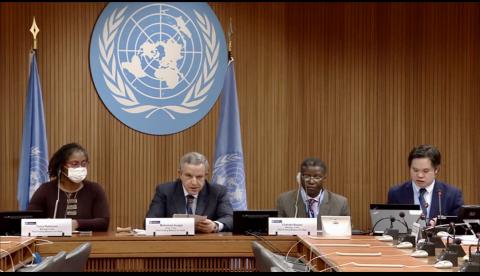
At the conclusion of its visit to Libya, the UN Independent Fact-Finding Mission on Libya stressed the responsibility of the Libyan authorities to take decisive steps to provide justice and redress to the vast number of victims suffering long-standing violations of human rights and international humanitarian law in the country.
Alkarama attaches great importance to the human rights file in Libya and has submitted numerous complaints to the UN Special Procedures on behalf of victims of violations. Thus, Alkarama highlights the importance of calling on the UN mission established by the Human Rights Council on 22 June 2020 to investigate violations and to urge the Libyan authorities to respond to their demands.
The UN mission visited Libya from 23 to 26 January 2023. Many victims and victims' representatives traveled from Benghazi, Sirte, Murzuq, Sabha and Misrata to meet with the members of the mission. At the end of the visit the UN mission issued a statement in which they stressed that the victims and their families have lost patience and are eager for the authorities to provide timely information on investigations and ensure that perpetrators are held accountable.
In the statement, the head of the fact-finding mission, Mr. Mohamed Auajjar, added: "The families of these victims have waited a long time for justice to be done. Libyan authorities owe them to share information about their loved ones, meet with them and give them answers. Silence is unacceptable." "We have also repeatedly asked for answers to the status of multiple investigations into gross human rights violations, but so far there has been no satisfactory response," Auajjar explained.
During their visit to the country, the mission's experts met with victims and victims' representatives who gave testimonies related to extrajudicial killings, torture, arbitrary detention, enforced disappearances, human trafficking, internal displacement, and the presence of mass graves and morgues containing bodies that families cannot access.
The mission was supposed to visit the victims in Sabha in southern Libya but the local authorities did not allow it despite numerous appeals. The experts regretted that they were unable to meet with the Public Prosecutor to receive information on the numerous cases narrated by the victims that fall within his mandate. It also regretted that the authorities did not allow access to prisons and detention centers across the country, despite reiterated requests.
Alkarama’s activism
Alkarama already drew attention to the crimes committed by the forces of retired Major General Khalifa Haftar with the support of Arab governments.
From time to time, Libya witnesses assassinations of commanders on the ground in Haftar's forces, including those wanted for international crimes for their involvement in war crimes, including summary executions of civilians.
Alkarama had previously expressed concern that the killings could be part of a ploy to liquidate prosecution witnesses against major criminals wanted for justice, and their regional and international supporters.
In this regard, Alkarama had addressed a number of UN bodies concerned with Libya, in particular the Independent Fact-Finding Mission on violations committed by all parties in Libya established by the Human Rights Council, asking them to investigate these killings and reveal their circumstances.
